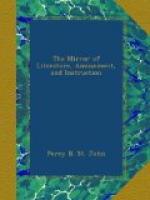and ostentation require that the servants of these
people should be numerous; their number unavoidably
makes them idle; idleness makes them debauched; debauchery
renders them often necessitous; the affluence or the
prodigality, the indolence or indulgence; or indifference
of their masters, affords them every possible facility
for being dishonest; and, beginning with the more
venial kinds of peculation, their conscience has an
opportunity of making an easy descent through the various
gradations of larceny, till the misdemeanant passes
into the felon. In the meantime, the master,
taking no blame to himself, nor considering that servants
are for the most part what their masters make them,
that they are the creatures, at least, of those circumstances
which their masters throw around them, and
might
be moulded in the generality of cases, with almost
certain effect, by the will and conduct of the master—passes
over, with an indolent and epicurean censure, the
lighter delinquencies which he may happen to detect,
laughs perhaps at his own laxity, and, when at length
alarmed, discharges the culprit without a character,
and relieves himself, at the expense of he knows not
whom, by making of a corrupted menial a desperate outcast.
If it be said that a man cannot be expected to change
his mode of life for the sake of his servants, it
might be answered, that any mode of life by which
each individual indulging in it hazards the perdition
of several of his fellow-creatures,
ought to
be changed, and cannot be persevered in without guilt.
But even if no such sacrifice were insisted upon,
there remain means by which the evil might be mitigated.
In the first place, the adherence to honesty on the
part of the masters might be exemplary; whereas their
actual measure of honesty would perhaps be indicated
with sufficient indulgence, if they were described
(in the qualified language which Hamlet applies to
himself) to be “indifferent honest.”
There is a currency of untruth in daily use amongst
fashionable people for purposes of convenience, which
proceeds to a much bolder extent than the social euphemisms
by which those of the middle classes also, not perhaps
without some occasional violation of their more tender
consciences, intimate a wish to be excused from receiving
a guest. Fashionable people, moreover, are the
most unscrupulous smugglers and buyers of smuggled
goods, and have less difficulty than others and less
shame, in making various illicit inroads upon the
public property and revenue. It is not to be denied
that these practices are, in point of fact, a species
of lying and cheating; and the latter of them bears
a close analogy to the sort of depredation in which
the dishonesty of a servant commonly commences.
To a servant it must seem quite as venial an offence
to trench upon the revenues of a duke, as to the duke
it may seem to defraud the revenues of a kingdom.
Such proceedings, if not absolutely to be branded
as dishonest, are not at least altogether honourable;
they are such as may be more easily excused in a menial
than in a gentleman. Nor can it ever be otherwise
than of evil example to make truth and honesty matters
of degree.




